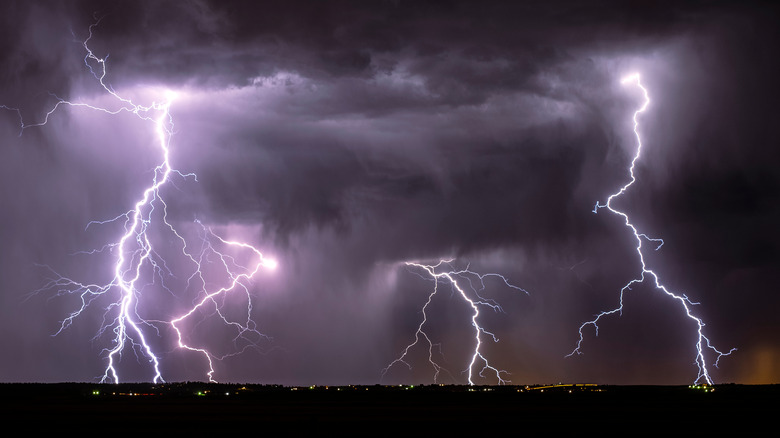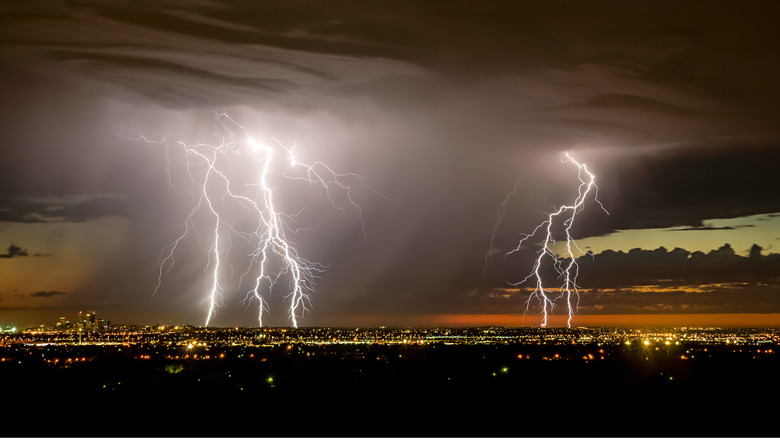Is It True That Lightning Is Hotter Than The Sun?
There are many things to be afraid of in nature, but the things that can hurt us are often the most awe-inspiring.
One natural event that exemplifies both the danger and beauty of nature is lightning during a thunderstorm. Watching it from the comfort of your home is one of those hygge moments, and you just feel cozy with a cup of tea. Some people even like these storms more than summer. Which is really interesting when you find out that lightning is hotter than the sun.
Yes, you read that right, the sun, which many people think is the hottest thing out there, pales in comparison to a single bolt of lightning. This might have people asking if that is really true. Well, it depends on the type of lightning and, as with many things that must be observed from a distance, dependent on the conditions when a storm is happening.
First, what exactly is lightning? The National Severe Storms Laboratory described lightning as a giant spark of electricity that happens when positive and negative ions in the clouds and the ground build up and release energy. This doesn't just happen during storms. Lightning has been observed during volcanic eruptions, snowstorms, or really intense fires.
Lightning is one of the oldest observed natural phenomenon and can strike from the cloud to the ground or vice-versa. We normally think of lightning as a skinny bolt from the sky, but there are different types of lightning, including the strange ball lightning.
Lightning will definitely burn you
Since lightning is dangerous, scientists often have to study it from afar. Although to be fair, they also have to study the sun from afar because it's in space. National Geographic explained lightning can heat up its surroundings to dangerous levels. It also causes the surrounding air to expand and vibrate, causing thunder. So when researchers wanted to find out its temperature, they had to examine the light it gave off and figured out how hot it got.
What scientists found was something no one really expected. Lightning, or at least some forms of it, can get up to five times hotter than the sun.
According to NASA, a return strike — when a bolt of lightning shoots up back to the clouds after hitting the ground — can reach temperatures of up to 50,000 degrees Fahrenheit. With the heat lightning can generate, it's no surprise that a single bolt can vaporize all water around it, per the National Weather Service. So you know, a single bolt of lightning can really burn you when being hit by it.
In contrast, the surface of the sun peaks at around 11,000 degrees Fahrenheit. Of course, that's not to say getting close to the sun will not burn you. Nay, it will still absolutely incinerate you.
Just don't risk it
Besides its heat, electricity from a lightning bolt presents a danger to anyone or anything it hits. As National Geographic noted, some things conduct electricity very well. If lightning strikes a car, for example, its tires conduct electricity, and the vehicle's metal carries the charge to the ground. Houses and buildings have to be grounded to make sure the dangerous currents don't go inside. Do be careful about touching running water if there's a lightning storm, as sometimes plumbing can shock a person.
NASA notes that lightning causes more direct deaths than any other weather event. A person hit by lightning can find their blood vessels burst, suffer cardiac arrest, and experience third-degree burns. Some people have received burns on their skin with lightning-like patterns called Lichtenberg figures. So you'll get to look like Harry Potter. Just because someone gets hit by lightning doesn't mean they die; many people survive, though there is a high possibility they will experience memory loss, attention and sleep disorders, dizziness, numbness, weakness, and an inability to sit for long periods of time.
At any given time, around 2,000 thunderstorms are raging globally, which means there could be about 8 million lightning bolts hitting the ground, per NASA. So, do be very careful. Lightning is dangerous even beyond the fact it can get hotter than the surface of the sun.
So, just stay inside, cozy up, and watch a thunderstorm roll by.


